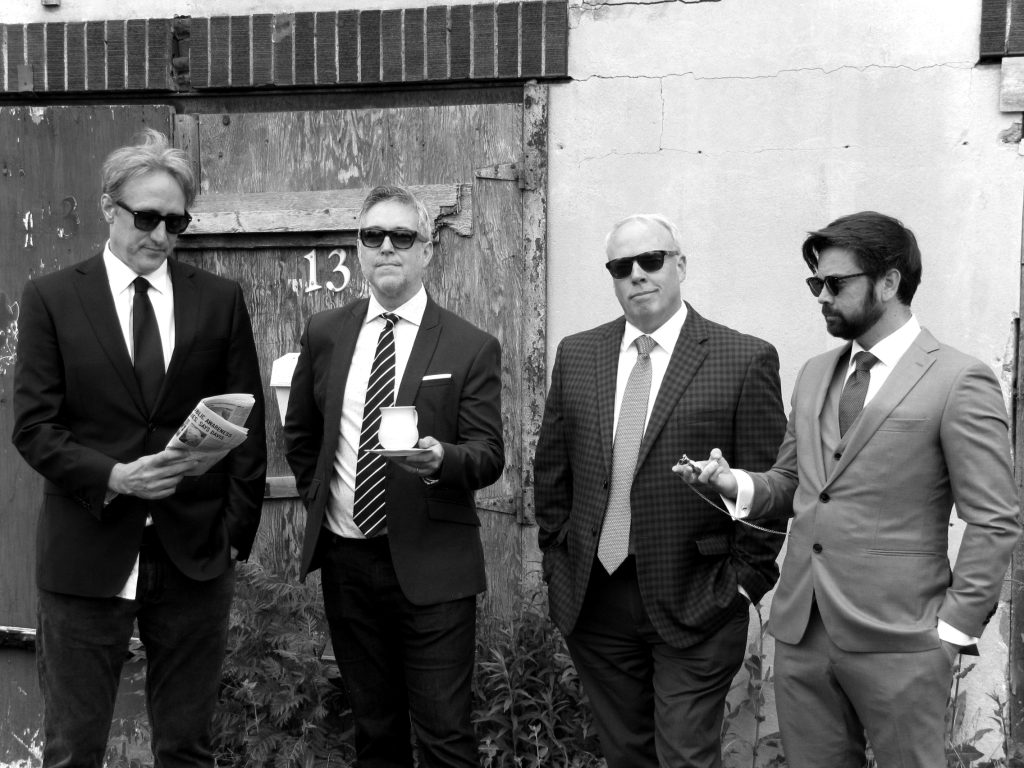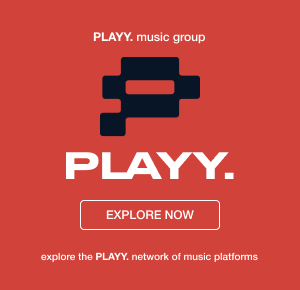
Born in the gritty sweet spot between Hamilton and Toronto back in 2020, Elephants and Stars have stormed onto the scene as a razor-sharp force in Canadian guitar-driven rock, fronted by the soulful growl of songwriter-vocalist-guitarist Manfred Sittmann and anchored by bassist Mike MacMillan, whose pedigrees in late-’90s/early-2000s outfits like Soap Opera and The First Time infuse every riff with hard-won authenticity. From their raw-edged Recovery and Dreamland EPs—both helmed by production wizard Ian Blurton (think Lowest of the Low and The Weakerthans)—to the propulsive full-length Last Chance Power Drive in 2022, with its fist-pumping anthems like ‘Turn It All Around’ and the shadowy narrative burner ‘On The Table’, the band has carved out a sound that’s equal parts Foo Fighters snarl and Jimmy Eat World heart, earning raves from Find Your Sounds for its infectious hooks and radio buzz across the UK and US.
Dive deeper into their restless creative fire with Manfred Sittmann in this exclusive interview, where he breaks down the scars, the sparks, and what comes next for a band that’s only just warming up.
How did that gritty stretch between Hamilton and Toronto spark the energy behind Elephants and Stars’ formation back in 2020?
Oddly enough I grew up right smack in the middle of those two places and spent a lot of time in both (and lived in both at one time or another) in a very working-class neighborhood where, at the time, Kiss (whom I loved) had fallen out of vogue with the older kids and a lot of their fans aged out of them and into punk rock. I was younger and thereby a few years behind, but I ended up going down that exact same path. I transitioned from Kiss and bands of that ilk into The Clash and Sex Pistols and eventually Dead Kennedys, etc. etc. I think a lot of that early influence of that experience is still very present in the music today. There are elements of that early Kiss and some punk rock with a bunch of other stuff mixed in. I ended up running into one of those older kids years later in a recording studio in Mississauga where we were recording and he worked. He told me a couple of days later that he went and listened to our recording so far and was “glad we didn’t suck,” which was cool to hear from one of the old neighborhood guys.
With your roots in bands like Soap Opera and The First Time, what pulled you and Mike MacMillan back into the fray for this project?
I think Mike and I were both really burned out at the end of the Soap Opera/First Time run. There were a lot of highs and lows (mostly lows) in dealing with labels and bandmates and bookers and so on and on. We took a pretty long break and decided we would get together and just try to write songs and have fun. We originally never planned to play love or make records. Ironically, the guy we were playing with at the time was the one who pushed us in that direction and then decided not to be a part of it once we decided to actually do it.
Walk us through the magic of teaming up with Ian Blurton on those early EPs—did his touch from Lowest of the Low bleed into your sound right away?
Magical is a perfect term for it. I had wanted to work with him going back to the early-to-mid 90s. I was a big Change of Heart fan and I loved his early production work, so I was super stoked that he agreed to produce us. As for the Lowest of the Low aspect, I would say just the opposite happened. He knew I was a fan so I think he wanted us to emphasize our other influence or sides, whatever you want to call it. He introduced me to a few bands that he thought we were also similar to like Hellacopters and White Reaper and thought it might be cool to lean more in that (i.e. or of a straight up “rock”) direction. Dreamland was definitely more rock-oriented than Recovery and Last Chance and Under The Earth both continued in that vein. I had heard he could be a bit of a taskmaster in the studio and – coincidentally – I asked Ron from Lowest of the Low what I should expect and all he told me was that I would love working with him. I am really grateful for the times we got to spend working with him. He really understood us and what was best for us. I wish every band had the chance to work with a producer like that even once.
Your influences run deep, from The Clash’s aggression to Teenage Fanclub’s melody—how do those threads weave into your daily songwriting grind?
Yeah, it is always kind of a balancing act with those two extremes, because I absolutely love the aggression of bands like the Clash and Motorhead and Propagandhi but at the same time, realize that we’re maybe not really that aggressive ourselves because we lean so heavily into the melody of a song. In fact, I think that is the single most important element to a song, particularly where we are concerned. But I think it is good to strike a balance if you can so you end up with something you can nod along to but also sing along to. It’s the classic Barnes vs Elias conundrum and we are the Pvt. Taylor of bands. (Sorry, that is a super obscure reference).
‘On The Table’ paints such a shadowy crime-fueled tale; what real-life spark ignited that guitar-driven storytelling on Last Chance Power Drive?
I am not sure there was any single spark, rather I think it was the result of a gradual evolution. If you listen to older songs, the lyrics tend to be very vague and unspecific. One thing I always wanted to get better at was lyrics that addressed something specific. I think I read an interview with Kris Roe of The Ataris who (possibly quoting Tom Waits??) saying something to the effect of great lyrics needing to be anatomically correct. I definitely think there is truth in that and my favorite lyricists (including Waits, Propagandhi’s Chris Hannah, Ron from Lowest of the Low, Laura Jane Grace, etc.) are all particularly good at that.
That fist-bump seal of approval from Richard Lloyd on the Under the Earth and Above Heaven title sounds legendary—what was the vibe in that moment after sharing the stage with Television?
That whole night was really cool.
I actually met him during sound check and I had just finished his book so I was asking him some questions about it. I had heard he wasn’t very approachable, but he was very nice.
Also, it was cool to play for ‘his’ audience who had no idea who we were. And, we seemed to go over pretty well. It’s always a little validating when a really established artist or their audience give you the positive nod. I mean, everyone likes a little validation now and again, right? We recently just did two more shows with them a couple of weeks ago. It was nice to be asked back.
From the escapist feel of Dreamland to the anthemic punch of ‘Gimme Ketamine’, how has your talent for blending hooks with heavy themes kept evolving?
I think once you have been writing for a while, and you find your footing as a writer a little you develop the confidence to try things you may not have earlier. When you are younger or less experienced, I feel like you want to write certain types of songs that fit a certain shape. I tried to hide my influences to prove I had a unique voice, which is actually utter nonsense. We’re all borrowing all the time and no one is particularly unique. I think once upon a time I wouldn’t have allowed myself to write a song like Ketamine because I would have felt it was either too simplistic or too derivative. Whereas now, I just lean into whatever I am coming up with.
Nights opening for Laura Jane Grace or Lowest of the Low must’ve been electric—what’s the hardest lesson those crowds and sets hammered home about baring your soul onstage?
To be honest, we’ve only ever been treated really well and very warmly whenever we’ve opened up for bigger bands like the Low or The Spoons or whomever. The hardest lesson we were ever force fed was at a music festival during the Soap Opera days. We were slotted on a metal show and, needless to say, we were not in the crowd’s wheelhouse. They hated us. They were screaming obscenities at us, calling us the F-slur, giving us the finger and the like. It did teach me, though, a couple of important lessons. One, not everyone is going to like you no matter how good you may be and two, it’s ok if a crowd doesn’t like you. It’s not the end of the world. I took it in fun and kept telling the crowd if they didn’t start being nice we were going to extend our set. I ended up getting a kick out of the show. It was us vs them.
If you could crank up one under-the-radar track from Superdrag or Buffalo Tom for a late-night drive right now, what’s your pick and why does it still light that fire?
I would definitely roll with Lighting the Way by Superdrag. I have a long and storied history with that song. I remember leaving Le Studio in Montreal, having just recorded the second Soap Opera record which I was at that point pretty proud of. I popped in an advance of that song that I had for the drive home and as it blasted out of the speakers, I suddenly felt very deflated because it was SO much better than what we had just done. I remember thinking that we’d never be as good as this. I have tried ripping that song off a few times. Turn It All Around from Last Chance Power Drive is a direct ‘homage’ to that song.
Stream Under The Earth And Above Heaven:
Follow Elephants and Stars:
Spotify – Facebook – Instagram – Threads – Bandcamp

